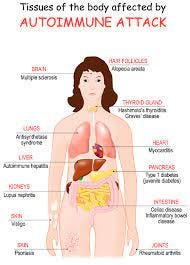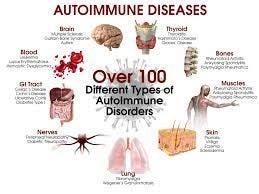Anyone With An Autoimmune Disorder?
Exploring the Depths of Autoimmune Disorders and Their Nutritional Management
The Surprising Truth About Autoimmune Disorders Autoimmune conditions are complex and often misunderstood. Contrary to common belief, managing these disorders extends beyond conventional dietary advice. While experts recommend a diet rich in fruits, vegetables, whole grains, and legumes, with moderation in alcohol and sugars, this approach may not be the ultimate solution. In fact, a deeper understanding of autoimmune pathology suggests that simply controlling your diet might not be enough.

Unraveling the Gut-Immune Connection The journey of understanding autoimmune disorders begins in an unexpected place: our gut. The gut is not just a digestive organ; it’s a critical immune barrier. Beyond this, our body has several other protective mechanisms, such as the skin, stomach acids, and the blood-brain barrier. The immune system’s complexity is astounding, yet it starts shaping up right from infancy. Factors like the mode of childbirth, breastfeeding, and early microbial exposures play pivotal roles in this process.
Infant Immunity and Microbial Beginnings A child’s immune development is influenced by various early life factors. The debate over natural childbirth versus C-sections, and the importance of breastfeeding, highlight the significance of early microbial exposure. Intriguingly, even the womb, once thought to be sterile, hosts microbes. These early exposures shape the immune system, laying the groundwork for future health or susceptibility to disorders.
The Miraculous World of Microbes in Farming Interestingly, the concept of microbial influence extends beyond human health to agriculture. Seeds in soil represent a microcosm of life, teeming with microbes that bolster growth and resilience. Disrupting this natural microbial balance can impede plant development, drawing a parallel to the human immune system.

Gut Barrier: The First Line of Defense A key component of the gut’s immune function is the presence of tight junctions, crucial for maintaining intestinal integrity. When these junctions malfunction, leading to increased intestinal permeability (or “leaky gut”), it can trigger a cascade of immune reactions, potentially leading to autoimmune conditions.
Zonulin: The Gatekeeper Protein Zonulin, a protein regulating these tight junctions, is crucial in autoimmune pathogenesis. Elevated levels of zonulin are often seen in autoimmune diseases, disrupting the gut’s ability to differentiate between harmful and benign substances. This misidentification can lead the immune system to attack the body’s own tissues.
Diet and Autoimmune Disorders: Beyond the Basics When considering dietary recommendations for autoimmune conditions, it’s essential to focus on foods that minimize inflammation and support gut health. The goal is to restore and maintain the integrity of the gut barrier, thereby reducing the likelihood of autoimmune reactions.
Conclusion: Embracing a Holistic Approach to Autoimmune Health Understanding and managing autoimmune disorders require a holistic approach that encompasses diet, lifestyle, and an appreciation of our body’s intricate immune mechanisms. By delving into the roots of these conditions, we can start a journey toward better health and well-being.
Links:
- American Autoimmune Related Diseases Association
- Harvard Health on Gut-Brain Connection
- National Institute of Allergy and Infectious Diseases — Autoimmune Diseases
Hashtags: #AutoimmuneHealth #GutHealth #ImmuneSystem #HolisticWellness #NutritionForAutoimmunity #Microbiome #ChronicInflammation
— — — — — — —
1. Best All Around Crypto Wallet: Gemini
- Security: ★★★★★
- User-Friendliness: ★★★★☆
- Supported Cryptocurrencies: Bitcoin, Ethereum, and many more.
- Cross-Platform Availability: Windows, macOS, and Linux.

Visit our blog at http://www.TheWetWhale.com
